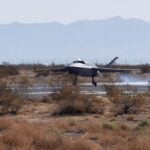
The U.S. Space Force is analyzing how to retain control over key elements of Golden Dome amid a possible bid by a SpaceX team to lease equipment to DoD for the future U.S. missile shield.
At a Tuesday Department of the Air Force hearing before the Senate Armed Services Committee, Sen. Jack Reed (D-R.I.), the committee’s ranking member, mentioned the U.S. Space Force’s release last month of the service’s first Space Warfighting Framework and asked Chief of Space Operations B. Chance Saltzman whether Space Force should control counter space systems in the kill chain, as having civilian-owned systems “raises some serious issues.”
“Yes, sir,” Saltzman replied. “We believe those should be government systems, and we’re actively going through an assessment process to determine precisely what are inherently governmental/inherently military functions that we would not want to contract out as commercial services. There are some fine lines there between the data they use and how that data is acquired and then how it’s used in terms of targeting. We’re trying to be very precise so we retain governmental control for those things in the kill chain.”
A week ago, Reed told the Defense Writers Group that there is a danger that Golden Dome becomes a “slush fund” (Defense Daily, May 14).
“Every time I read about it [Golden Dome], there’s a paragraph about [SpaceX CEO] Elon Musk’s participation with Starlink as the communication link, etc.,” Reed said last week. “We have to be very careful of this because this is essentially a kill chain from observation to execution, and we typically don’t have non-military contractors in the middle of something like that. We have to think very seriously about how do we legally do this. Do we lease with the right to retain [data rights] or the right to prevent it from being leased to any other entity–these types of communications systems and weapons systems, and they’re doing that right now. Space Force is very much involved in that and trying to think out how do we put together a communications system and link it to the firing system.”
Saltzman’s number two, Vice Chief of Space Operations Gen. Michael Guetlein, is to run the Golden Dome program.
A May 5 Congressional Budget Office report estimated deployment and operation of Golden Dome space-based interceptors alone, without sensors, would cost between $161 billion to $264 billion on the lower-end, while a more extensive system could cost $542 billion to $831 billion (Defense Daily, May 20).
At Tuesday’s hearing, in response to a question from Sen. Angus King (I-Maine) on a budget increase for the Space Force, Saltzman said that “the last three years of funding has not allowed me to go as quickly as possible putting counter space capabilities together that address the targets that I’m being asked to address by U.S. Space Command amongst other combatant commands.”













